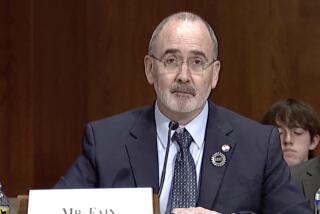Readers React: The insidious campaign against public employee unions
To the editor: If I were tasked with writing an article to further the anti-worker goals of “right to work” proponents, it might look a lot like the op-ed article by Daniel DiSalvo of the Manhattan Institute. (“California’s public unions have too much clout and compensation,” op-ed, Feb. 27)
It sounds perfectly reasonable to argue for saving taxpayer money by paying public sector workers less until one realizes that this strategy is designed to save the wealthiest taxpayers the most while middle-class government workers are harmed, exacerbating our income inequality problem.
What better way for those at the top to run up the score on everybody else than by going after private-sector collective bargaining first, resulting in decades of real wage stagnation, and then attacking the higher relative wages and benefits of public sector union employees?
Setting aside the questionable moral implications, it’s a brilliant strategy. They’re crushing it — or, should I say, they’re crushing us.
Jon Thingvold, Murrieta
..
To the editor: DiSalvo has identified the conundrum facing not only California Democrats, but indeed our entire country, to govern itself efficiently and not be held to ransom by inept negotiators. The important long-term problem he identifies is the exorbitant cost of government employees’ pensions and healthcare.
However, DiSalvo’s solution, a national “right to work” law, is a cop-out. Unions (and indeed public servants themselves) must help solve the problem, and they will only obstruct that idea.
“Changing the current mode” of labor relations is what DiSalvo is calling for, but that isn’t happening. Look at the damage caused by the recent port stoppage, yet there was no penalty for those negotiators who failed to achieve a new labor contract.
As a former labor relations professor, I have long favored penalties in the event of strikes, work slowdowns, lockouts or other economically damaging measures. A law banning strikes, for example, is not likely, but a simple fine assessed against both sides seems reasonable.
Douglas Sikorski, Laguna Beach
Follow the Opinion section on Twitter @latimesopinion and Facebook
More to Read
A cure for the common opinion
Get thought-provoking perspectives with our weekly newsletter.
You may occasionally receive promotional content from the Los Angeles Times.






